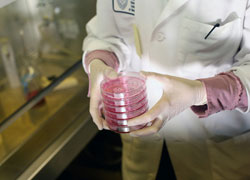Genetic damage in elderly immune systems
Cell ageing receives a lot of media and scientific attention. It is not only the realm of the cosmetics and nutraceutical industries. Pharmaceutical therapy is a potentially massive area as cell ageing is responsible for many of the degenerative diseases all too evident in the elderly. The ageing process is multifaceted and one important aspect is the ageing of the immune system. Without the disabling effects of diseases like cancer, often a result of a compromised immune system, the ageing process would not necessarily mean such a reduction in life quality. Partners in the European funded T-CIA project researched into the genetic basis of ageing in human T lymphocytes, one of the main agents of the adaptive defence system. The team at Nottingham Trent University investigated genetic damage in human T cells and their capacity to repair these errors as they were aged in vitro. T cell clones (TCCs) were studied from three main age groups, 26, 45 and 80 and over years old. The clones were observed in culture until they underwent apoptosis, or programmed cell death. The cells were also subjected to various chemical DNA damaging agents as well as ultraviolet irradiation. Two repair systems were under scrutiny. These were PARP, an enzyme poly (ADP-ribose) polymerase that activates and recruits DNA repair enzymes and the MMR (mismatch repair) systems. Both mechanisms were impaired during cell ageing in the two more youthful samples but in the 80 year old cell, they appeared to be more efficient. Furthermore, older donors appeared to have intact DNA in the area of the telomere according to a new fluorescent in situ hybridisation (FISH) technique. The telomere is found at the end of chromosomes and tends to disintegrate with every cell division. The theory is that this region protects valuable DNA further down the chromosome and disorganising it causes the dividing cell to make genetic mistakes. Further research will help to uncover the genetic and molecular mechanisms as to why some people age with more ease and comfort than others. From the point of view of resistance to disease and cancer, the ageing of the immune system no doubt holds some important clues.







